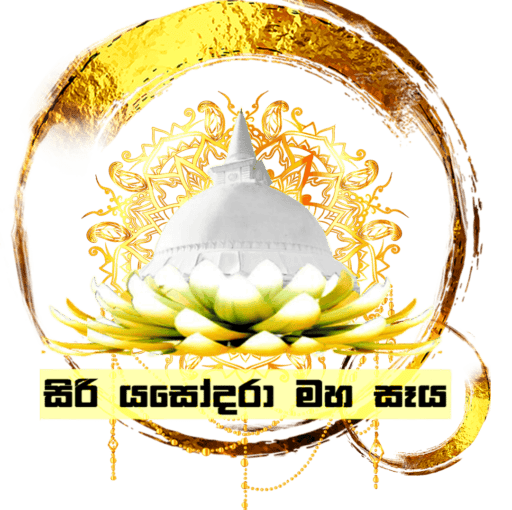Yā abhirūpa dassanīyā – bhikkunī sangha sōbhanī
Sā āsavā parikkīna – vītharāgā mahidhikā
Taṁ mahā puññavathiṁ parinibbuthiṁ
Vandāmi rāhula māthā yashodharā’ti
Yā abhirūpa dassanīyā – bhikkunī sangha sōbhanī
Sā āsavā parikkīna – vītharāgā mahidhikā
Taṁ mahā puññavathiṁ parinibbuthiṁ
Vandāmi rāhula māthā yashodharā’ti
Possessing divine beauty and pleasing to all, the Bhikkhunī who illuminated the Order of Nuns eradicated all defilements and became passion-free, endowed with great psychic powers. With deep devotion, I venerate Prince Rāhula’s beloved mother, the great Arahant Yaśodharā, rich in vast merits, who attained Nibbāna.
***** Possessing divine beauty and pleasing to all, the Bhikkhunī who illuminated the Order of Nuns eradicated all defilements and became passion-free, endowed with great psychic powers. With deep devotion, I venerate Prince Rāhula’s beloved mother, the great Arahant Yaśodharā, rich in vast merits, who attained Nibbāna. *****
Yashodhara Theri: The Journey to Arahantship -1
The relationship between Prince Siddhārtha and Princess Yaśodharā was not an ordinary one. It had its roots in an extremely long past and was deeply established. Although it is difficult to trace the exact beginning of their saṁsāric bond, during the time of the Dīpaṁkara Supreme Buddha, a remarkable event took place.
At that time, the Bodhisatta was born into a very wealthy brahmin family. When he grew into youth and strength, instead of marrying and managing his wealth, he longed to renounce household life and live as an ascetic. His parents, however, strongly opposed his wish. Yet, immediately after the passing away of his beloved parents, he renounced all luxuries, gave away his wealth, and became an ascetic. His name was Sumedha, and thus he came to be known as the ascetic Sumedha……
Yashodhara Theri: The Journey to Arahantship -1
The relationship between Prince Siddhārtha and Princess Yaśodharā was not an ordinary one. It had its roots in an extremely long past and was deeply established. Although it is difficult to trace the exact beginning of their saṁsāric bond, during the time of the Dīpaṁkara Supreme Buddha, a remarkable event took place.
At that time, the Bodhisatta was born into a very wealthy brahmin family. When he grew into youth and strength, instead of marrying and managing his wealth, he longed to renounce household life and live as an ascetic. His parents, however, strongly opposed his wish. Yet, immediately after the passing away of his beloved parents, he renounced all luxuries, gave away his wealth, and became an ascetic. His name was Sumedha, and thus he came to be known as the ascetic Sumedha……
Yashodhara Theri: The Journey to Arahantship -2
When Prince Rāhula became a monk, Yaśodharā once again sought permission from King Suddhodana to enter the order. The king replied:
“Daughter, if you were to ordain now, people in the future might condemn it, saying that you became a nun merely out of sorrow at losing your only son.
Do you not remember that even when you lost your beloved Jāliya and Kanhajinā, you bore that pain and endured the grief? The occasions on which you have had to give away your children—born of your own womb, with their little hands bound together—are more numerous than the very mountain Sineru. Yet even then, you endured the suffering and sorrow.
Now, when my son, Prince Siddhārtha, has attained Enlightenment and ordained his only son, how can we resist the destiny that has unfolded? First, I was overcome by Siddhārtha, then by Nanda, and now by my little grandson Rāhula. How can I lose you as well?”……
Yashodhara Theri: The Journey to Arahantship -2
When Prince Rāhula became a monk, Yaśodharā once again sought permission from King Suddhodana to enter the order. The king replied:
“Daughter, if you were to ordain now, people in the future might condemn it, saying that you became a nun merely out of sorrow at losing your only son.Do you not remember that even when you lost your beloved Jāliya and Kanhajinā, you bore that pain and endured the grief? The occasions on which you have had to give away your children—born of your own womb, with their little hands bound together—are more numerous than the very mountain Sineru. Yet even then, you endured the suffering and sorrow.
Now, when my son, Prince Siddhārtha, has attained Enlightenment and ordained his only son, how can we resist the destiny that has unfolded? First, I was overcome by Siddhārtha, then by Nanda, and now by my little grandson Rāhula. How can I lose you as well?”……
Yashodhara Theri: The Journey to Arahantship -3
From the day she was ordained, Yaśodharā began to receive abundant offerings and reverence from the people. Devotees lined up with carts full of gifts. For her sake, they built beautiful shrines and nunneries, complete with all the necessary facilities. Just as rivers flow unceasingly towards the ocean, people from every corner of Jambudvīpa—men and women alike—came by wagon, bringing food, drinks, robes, and medicines. Thus, the nunnery was always filled with crowds and alive with the devotion of the faithful.
One day, after listening to the Dhamma in the presence of the Blessed One, before returning, she approached the Buddha and said:……
Yashodhara Theri: The Journey to Arahantship -3
From the day she was ordained, Yaśodharā began to receive abundant offerings and reverence from the people. Devotees lined up with carts full of gifts. For her sake, they built beautiful shrines and nunneries, complete with all the necessary facilities. Just as rivers flow unceasingly towards the ocean, people from every corner of Jambudvīpa—men and women alike—came by wagon, bringing food, drinks, robes, and medicines. Thus, the nunnery was always filled with crowds and alive with the devotion of the faithful.
One day, after listening to the Dhamma in the presence of the Blessed One, before returning, she approached the Buddha and said:……
